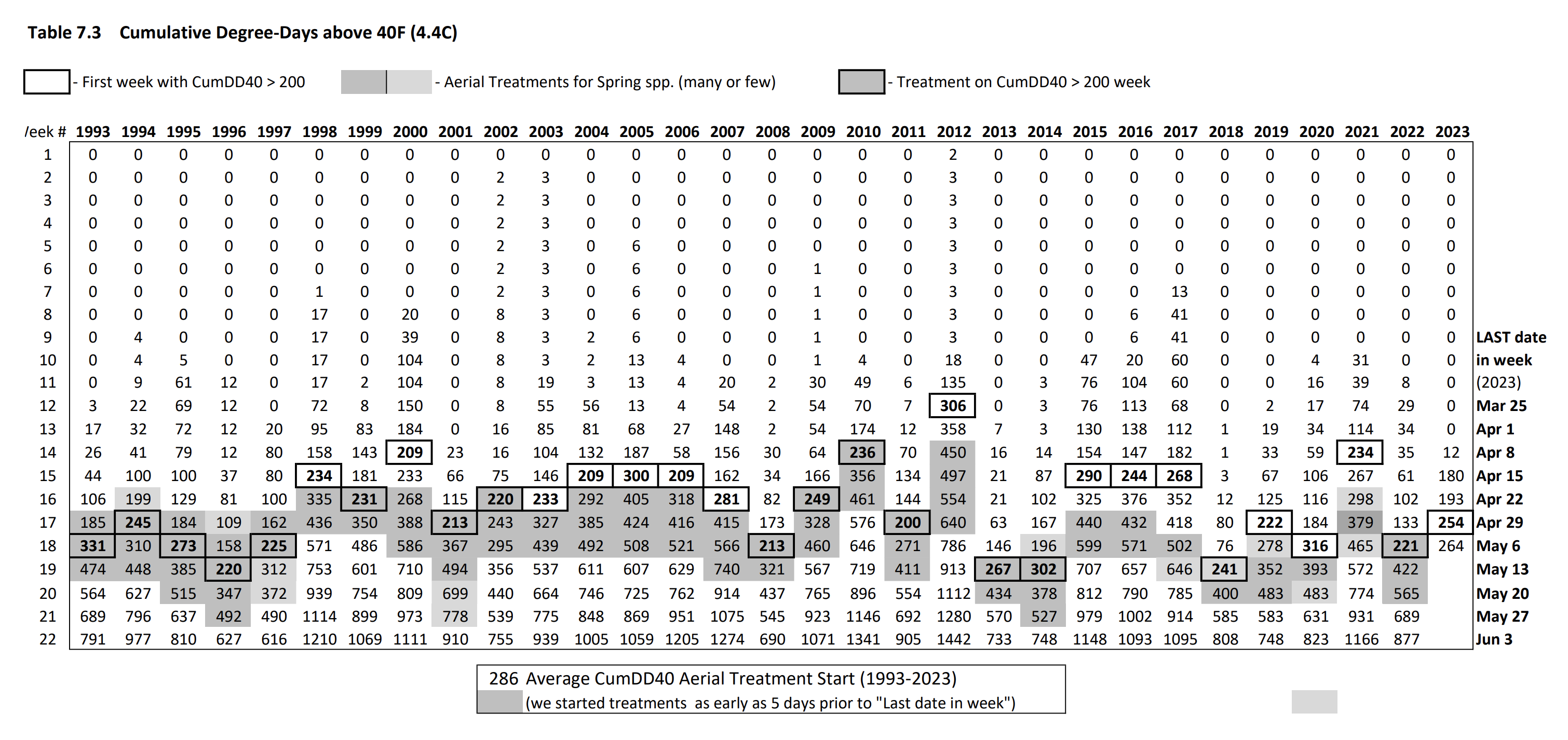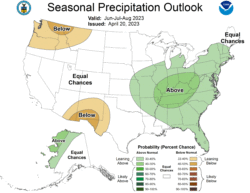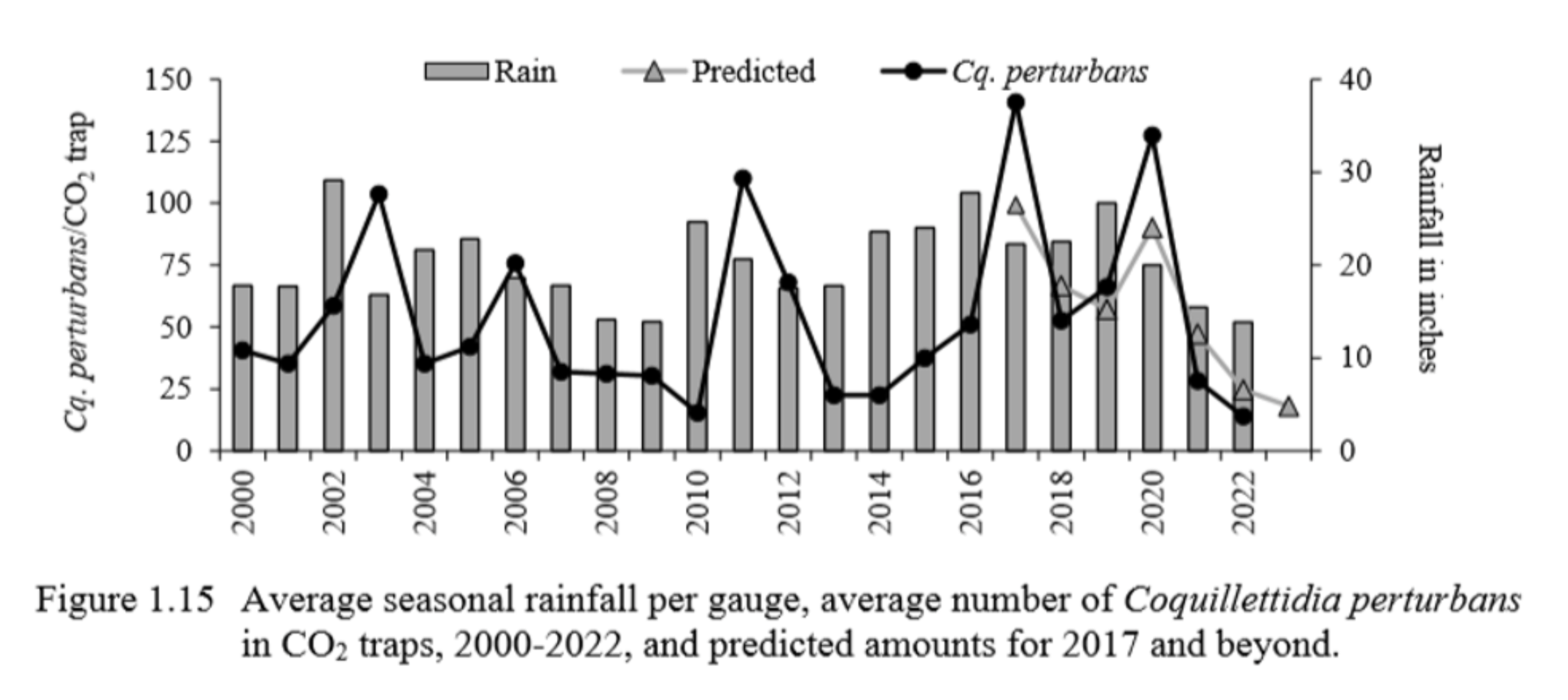
PRESS RELEASE: Mosquito Control activity has begun in your community
April 20, 2023
Weekly Update – May 15th – Adult Mosquitoes Abundant in Anoka, Washington Counties; Black Flies Appear
May 22, 2023
Sarah from the MMCD Oakdale facility searches for active mosquito larvae in early spring.
Cold spring temperatures will delay when people first start noticing mosquitoes in the Twin Cities. We may be in for more mosquitoes this year than 2022.
A few warm days in early April got the mosquito larvae active in Minnesota, but the subsequent cool temperatures have delayed their emergence. Mosquito larvae develop in standing water and when the water temperatures are cold, their life cycle slows down and they remain in the larval stage longer. In mid-summer when water temperatures are warmer the life cycle for a common floodwater mosquito would have them in the water for about a week - 4 to 6 days as larvae and 1 to 2 days as pupae before emerging as an adult mosquito. In a cold spring that process can take weeks.
At the Metropolitan Mosquito Control District we track days above 40 degrees Fahrenheit to get an estimate of when we can expect mosquitoes to emerge. We also use this metric to help determine when we need to begin our helicopter treatments for ponds and wetlands where larvae are active. While this month may have seemed cold, we are actually pretty in line with 4 of the past 5 years in terms of degree days above 40F.
Based on this estimate we will likely begin seeing mosquitoes in noticeable numbers around the end of May or early June.

Spring of 2022 is trending similar to 2019, 2020, and 2022.
Larval mosquitoes currently active are small and slow, but abundant.
Field staff are currently out searching for mosquito larvae to determine where treatments should take place. According to MMCD entomologist Diann Crane, the larval samples that are being brought to the lab are mostly at 2nd and 3rd instar (out of 4 instars that occur before pupation). They are moving slowly and not likely to be ready to come out of the water for some time.
However, there are quite a few being found, mostly various Spring Aedes species, and so facilities decided to begin treatments now in order to ensure there is ample time to get all treatments finished before mosquitoes emerge. Helicopter treatments began this week in Anoka and Hennepin Counties and will expand to other counties in the coming days.
Predictions for summer weather suggest precipitation will be average for 2023.
 After two years of drought and low adult mosquito numbers overall, could we be back to a return to a normal mosquito abundance summer in Minnesota? The predictions say - probably!
After two years of drought and low adult mosquito numbers overall, could we be back to a return to a normal mosquito abundance summer in Minnesota? The predictions say - probably!
The most common nuisance mosquito we have in Minnesota is the Summer floodwater mosquito (Aedes vexans) which is heavily dependent on rainfall - usually an inch or more of rain will trigger a hatch of this species' eggs. This means that the best way to predict mosquito numbers for this species is to estimate the rainfall for the season.
Both 2021 and 2022 were unusually dry with most of Minnesota in drought conditions throughout both summers. According to the National Weather Service and NOAA 2023 is likely to see a return to normal precipitation with June, July, and August predicted to see "equal chances" of average rain. If this prediction holds, mosquito numbers are likely to rebound slightly to at least higher numbers than last year.
There is one species of mosquitoes that we can predict with some accuracy thanks to a model developed by Dr. Roger Moon at the University of Minnesota. The cattail mosquito (Coquillettidia perturbans) is a unique species that overwinters as larvae by attaching to the roots of vegetation (often cattails, hence the name) and emerges in a single brood in the summer around the end of June and early July. Our entomology lab makes predictions based on previous year rainfall and adult mosquitoes captured in CO2 traps and based on the model, it is likely that 2023 will have few cattail mosquitoes - with a prediction similar to the result found last year.
This means that even if we do see precipitation this year that is closer to average, we are unlikely to see a surge of mosquitoes around the 4th of July like we often do.
View the full details about cattail mosquitoes and the model that makes predictions in our Technical Advisory Board report.

Average seasonal rainfall per gauge, average number of Coquillettidia perturbans in CO2 traps, 2000-2021, and predicted amounts for 2017 and beyond.
Ticks are active already and will likely be out in similar numbers as recent years.
Our staff who have been out doing field work have already reported several tick encounters and we've had reports from residents of the Twin Cities of finding ticks on pets and people already this year. Ticks usually come out earlier in the season than mosquitoes and stay out later in the fall. It's a good reminder to check yourself, your kids, and your pets if you're ever in tick habitat!
Earlier this month KARE 11 aired a story featuring our predictions for summer and spring mosquito activity. Check that out below and be sure to revisit MMCD.org every week this summer for updates on mosquitoes, black flies, and ticks!




